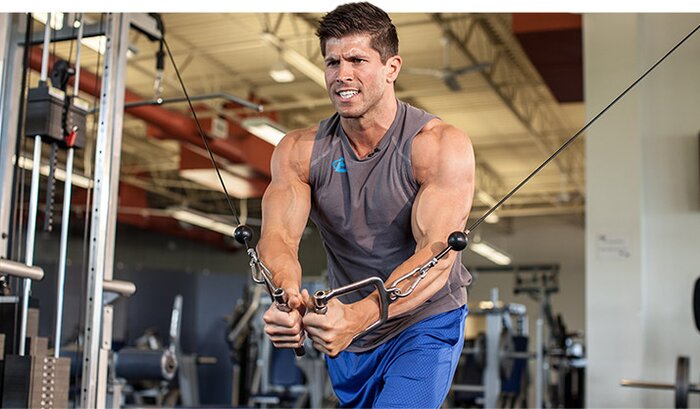Creatine, glutamine, and protein are three of the most popular supplements for gaining lean muscle and strength. But what are the best times to take these proven supplements?
Here's what I've found personally works best for both my clients and myself when it comes to these three bodybuilding staples. When taken correctly, I believe they may be all the supplements you need, along with fish oil and a good multivitamin.

Get it right and make the most of your training—and your hard-earned money!
The Best Time to Take Creatine
Whenever you find it easiest to take creatine is probably good enough. There's not a lot of research indicating that taking it at one particular time is significantly better than any other.
Personally, I like to take a blend of creatine, carbs (in the form of juice), and protein about half an hour before training, and the same blend after training. This is also the basic approach that Dr. Jim Stoppani advocates in the article "Ask the Supplement Guru: When Should I Take Creatine?"
This "bracketing" technique helps set up an anabolic (muscle-building) state for your muscles and helps prevent muscle breakdown from a workout (catabolism). You'll be well stocked with anabolic amino acids when you're most receptive to them, you're topped off with carbs both during and after training, and you're always full of creatine.
If the before-and-after technique is too complicated for you, just taking 5 grams post-workout is also very effective at producing strength and size gains, according to a 2013 study.1 Third place would be 5 grams whenever works for you.
When you first start taking creatine, it's common to load with 20-25 grams per day in 5 gram servings for five days. This is effective, but not totally necessary. Just 3-5 grams a day will get you to the same place soon enough, writes Ciaran Fairman in "Do I Need to Load With Creatine."
The Best Time to Take Glutamine
The standard protocol for glutamine is to take 2-3 servings of 5 grams a day, with one of them right before bed. This is what I recommend as well, and in my book, the dose before bed is the most important!

Sleep is already the time when you experience the greatest releases of growth hormone, and not coincidentally, it's the time when you turn all that hard work you've been doing into physical results. Glutamine is also thought to be able to help combat symptoms of overtraining, so pairing it with deep, recuperative rest is a no-brainer.2
Aside from that, 5 grams in the morning and 5 grams during a workout remain tried-and-true recommendations.
The Best Time to Take Protein
There are a variety of protein supplements you could take, but the most popular are whey and casein (from milk) for the best protein synthesis and easiest digestion.
Whey protein absorbs quickly for muscle recovery and growth, taking less than an hour after drinking your protein shake to fully metabolize. We call this protein “fast-acting.” Casein, on the other hand, absorbs slowly, taking about 3 to 4 hours for the same effect, so we call this protein “slow-acting.”
Both whey and casein, over other protein supplements, appear to offer the greatest gains in muscle recovery and growth.
Getting adequate protein matters more than when you take it.3 But once you're sure you're getting enough, there is definitely the right type of protein for the right time of day.
- After a workout. A 2013 meta-analysis poked a hole in the idea of an "anabolic window" that lasts 30-45 minutes after a workout.3 But make no mistake, this is still a good time to have a shake! After you train, both protein synthesis and protein breakdown are elevated. Unless you take protein, only the breakdown will remain elevated—and that's what you don't want. Plus, a protein shake taken consistently after training has been shown again and again to result in greater muscle and strength gains.4-8
- Before a workout. As Nick Coker notes in the article "The Case for Pre-workout Protein," a protein shake before training has actually been shown to be as effective as one taken post-workout. Fast-acting whey can work on repairing your muscles even as you’re breaking them down!9 Of course, this isn't for everybody, or for every workout—if you toss back a huge protein shake and then do intense cardio intervals, your stomach may let you hear about it.
- Right before bed. Having a protein shake before bed has been linked to increased fat loss, as well as muscle and strength gains. Casein would be the better protein to take before bed, because it is slow-acting and feeds the muscles over a longer period than whey, working on your gains while you sleep! 10-12 What's not to like?13
- Right upon waking. Research indicates that you're more sensitive to the effect of the amino acids in protein for up to 24 hours after training.14 A good, fast-acting whey protein shake when you rise is a great way to start feeding those muscles again. If the shake is going to take the place of breakfast, use slow-acting casein protein instead to control appetite and cravings throughout the day.
References
- Antonio, J., & Ciccone, V. (2013). The effects of pre versus post workout supplementation of creatine monohydrate on body composition and strength. Journal of the International Society of Sports Nutrition, 10(1), 36.
- Antonio, J., & Street, C. (1999). Glutamine: a potentially useful supplement for athletes. Canadian Journal of Applied Physiology, 24(1), 1-14.
- Schoenfeld, B. J., Aragon, A. A., & Krieger, J. W. (2013). The effect of protein timing on muscle strength and hypertrophy: a meta-analysis. Journal of the International Society of Sports Nutrition, 10(1), 53
- Biolo, G., Tipton, K. D., Klein, S., & Wolfe, R. R. (1997). An abundant supply of amino acids enhances the metabolic effect of exercise on muscle protein. American Journal of Physiology-Endocrinology and Metabolism, 273(1), E122-E129.
- Phillips, S. M., Tipton, K. D., Aarsland, A. S. L. E., Wolf, S. E., & Wolfe, R. R. (1997). Mixed muscle protein synthesis and breakdown after resistance exercise in humans. American Journal of Physiology-Endocrinology and Metabolism, 273(1), E99-E107.
- Biolo, G., Maggi, S. P., Williams, B. D., Tipton, K. D., & Wolfe, R. R. (1995). Increased rates of muscle protein turnover and amino acid transport after resistance exercise in humans. American Journal of Physiology-Endocrinology and Metabolism, 268(3), E514-E520.
- Tieland, M., Dirks, M. L., van der Zwaluw, N., Verdijk, L. B., van de Rest, O., de Groot, L. C., & van Loon, L. J. (2012). Protein supplementation increases muscle mass gain during prolonged resistance-type exercise training in frail elderly people: a randomized, double-blind, placebo-controlled trial. Journal of the American Medical Directors Association, 13(8), 713-719.
- Pennings, B., Koopman, R., Beelen, M., Senden, J. M., Saris, W. H., & van Loon, L. J. (2011). Exercising before protein intake allows for greater use of dietary protein—derived amino acids for de novo muscle protein synthesis in both young and elderly men. The American Journal of Clinical Nutrition, 93(2), 322-331.
- Tipton, K. D., Elliott, T. A., Cree, M. G., Aarsland, A. A., Sanford, A. P., & Wolfe, R. R. (2007). Stimulation of net muscle protein synthesis by whey protein ingestion before and after exercise. American Journal of Physiology-Endocrinology and Metabolism, 292(1), E71-E76.
- Madzima, T. A., Panton, L. B., Fretti, S. K., Kinsey, A. W., & Ormsbee, M. J. (2014). Night-time consumption of protein or carbohydrate results in increased morning resting energy expenditure in active college-aged men. British Journal of Nutrition, 111(1), 71-77.
- Res, P. T., Groen, B., Pennings, B., Beelen, M., Wallis, G. A., Gijsen, A. P., ... & Van Loon, L. J. (2012). Protein ingestion before sleep improves postexercise overnight recovery. Medicine & Science in Sports & Exercise, 44(8), 1560-1569.
- Snijders, T., Smeets, J. S., van Vliet, S., van Kranenburg, J., Maase, K., Kies, A. K., ... & van Loon, L. J. (2015). Protein ingestion before sleep increases muscle mass and strength gains during prolonged resistance-type exercise training in healthy young men. The Journal of Nutrition, 145(6), 1178-1184.
- Trommelen, J., Holwerda, A. M., Kouw, I. W., Langer, H., Halson, S. L., Rollo, I., ... & Van Loon, L. J. (2016). Resistance Exercise Augments Postprandial Overnight Muscle Protein Synthesis Rates. Medicine and Science in Sports and Exercise, 48(12), 2517-2525.
- Burd, N. A., West, D. W., Moore, D. R., Atherton, P. J., Staples, A. W., Prior, T., ... & Phillips, S. M. (2011). Enhanced amino acid sensitivity of myofibrillar protein synthesis persists for up to 24 h after resistance exercise in young men. The Journal of Nutrition, 141(4), 568-573.

